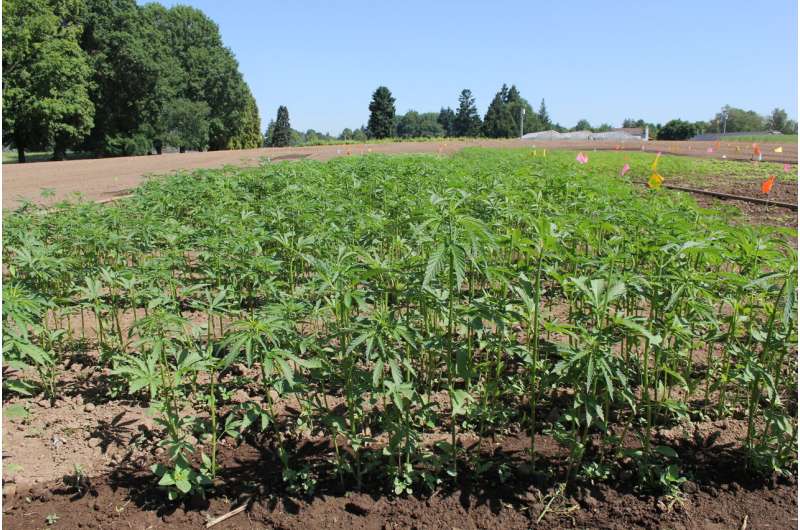Research shows hemp compounds prevent coronavirus from entering human cells

Hemp compounds identified by Oregon State University research via a chemical screening technique invented at OSU show the ability to prevent the virus that causes COVID-19 from entering human cells.
Findings of the study led by Richard van Breemen, a researcher with Oregon State's Global Hemp Innovation Center, College of Pharmacy and Linus Pauling Institute, were published today in the Journal of Natural Products.
Hemp, known scientifically as Cannabis sativa, is a source of fiber, food and animal feed, and multiple hemp extracts and compounds are added to cosmetics, body lotions, dietary supplements and food, van Breemen said.
Van Breemen and collaborators, including scientists at Oregon Health & Science University, found that a pair of cannabinoid acids bind to the SARS-CoV-2 spike protein, blocking a critical step in the process the virus uses to infect people.
The compounds are cannabigerolic acid, or CBGA, and cannabidiolic acid, CBDA, and the spike protein is the same drug target used in COVID-19 vaccines and antibody therapy. A drug target is any molecule critical to the process a disease follows, meaning its disruption can thwart infection or disease progression.
"These cannabinoid acids are abundant in hemp and in many hemp extracts," van Breemen said. "They are not controlled substances like THC, the psychoactive ingredient in marijuana, and have a good safety profile in humans. And our research showed the hemp compounds were equally effective against variants of SARS-CoV-2, including variant B.1.1.7, which was first detected in the United Kingdom, and variant B.1.351, first detected in South Africa."
Those two variants are also known the alpha and beta variant, respectively.
Characterized by crown-like protrusions on its outer surface, SARS-CoV-2 features RNA strands that encode its four main structural proteins—spike, envelope, membrane and nucleocapsid—as well as 16 nonstructural proteins and several "accessory" proteins, van Breemen said.
"Any part of the infection and replication cycle is a potential target for antiviral intervention, and the connection of the spike protein's receptor binding domain to the human cell surface receptor ACE2 is a critical step in that cycle," he said. "That means cell entry inhibitors, like the acids from hemp, could be used to prevent SARS-CoV-2 infection and also to shorten infections by preventing virus particles from infecting human cells. They bind to the spike proteins so those proteins can't bind to the ACE2 enzyme, which is abundant on the outer membrane of endothelial cells in the lungs and other organs."
Using compounds that block virus-receptor interaction has been helpful for patients with other viral infections, he notes, including HIV-1 and hepatitis.
Van Breemen, Ruth Muchiro of the College of Pharmacy and Linus Pauling Institute and five scientists from OHSU identified the two cannabinoid acids via a mass spectrometry-based screening technique invented in van Breemen's laboratory. Van Breemen's team screened a range of botanicals used as dietary supplements including red clover, wild yam, hops and three species of licorice.
An earlier paper in the Journal of the American Society for Mass Spectrometry described tailoring the novel method, affinity selection mass spectrometry, to finding drugs that would target the SARS-CoV-2 spike protein.
In the later research, lab tests showed that cannabigerolic acid and cannabidiolic acid prevented infection of human epithelial cells by the coronavirus spike protein and prevented entry of SARS-CoV-2 into cells.
"These compounds can be taken orally and have a long history of safe use in humans," van Breemen said. "They have the potential to prevent as well as treat infection by SARS-CoV-2. CBDA and CBGA are produced by the hemp plant as precursors to CBD and CBG, which are familiar to many consumers. However, they are different from the acids and are not contained in hemp products."
Van Breemen explains that affinity selection mass spectrometery, which he abbreviates to AS-MS, involves incubating a drug target like the SARS-CoV-2 spike protein with a mixture of possible ligands—things that might bind to it—such as a botanical extract, in this case hemp extract.
The ligand-receptor complexes are then filtered from the non-binding molecules using one of several methods.
"We identified several cannabinoid ligands and ranked them by affinity to the spike protein," van Breemen said. "The two cannabinoids with the highest affinities for the spike protein were CBDA and CGBA, and they were confirmed to block infection.
"One of the primary concerns in the pandemic is the spread of variants, of which there are many, and B.1.1.7 and B.1.351 are among the most widespread and concerning," he added. "These variants are well known for evading antibodies against early lineage SARS-CoV-2, which is obviously concerning given that current vaccination strategies rely on the early lineage spike protein as an antigen. Our data show CBDA and CBGA are effective against the two variants we looked at, and we hope that trend will extend to other existing and future variants."
Van Breemen said resistant variants could still arise amid widespread use of cannabinoids but that the combination of vaccination and CBDA/CBGA treatment should make for a much more challenging environment for SARS-CoV-2.
"Our earlier research reported on the discovery of another compound, one from licorice, that binds to the spike protein too," he said. "However, we did not test that compound, licochalcone A, for activity against the live virus yet. We need new funding for that."
More information: Richard B. van Breemen et al, Cannabinoids Block Cellular Entry of SARS-CoV-2 and the Emerging Variants, Journal of Natural Products (2022). DOI: 10.1021/acs.jnatprod.1c00946




















